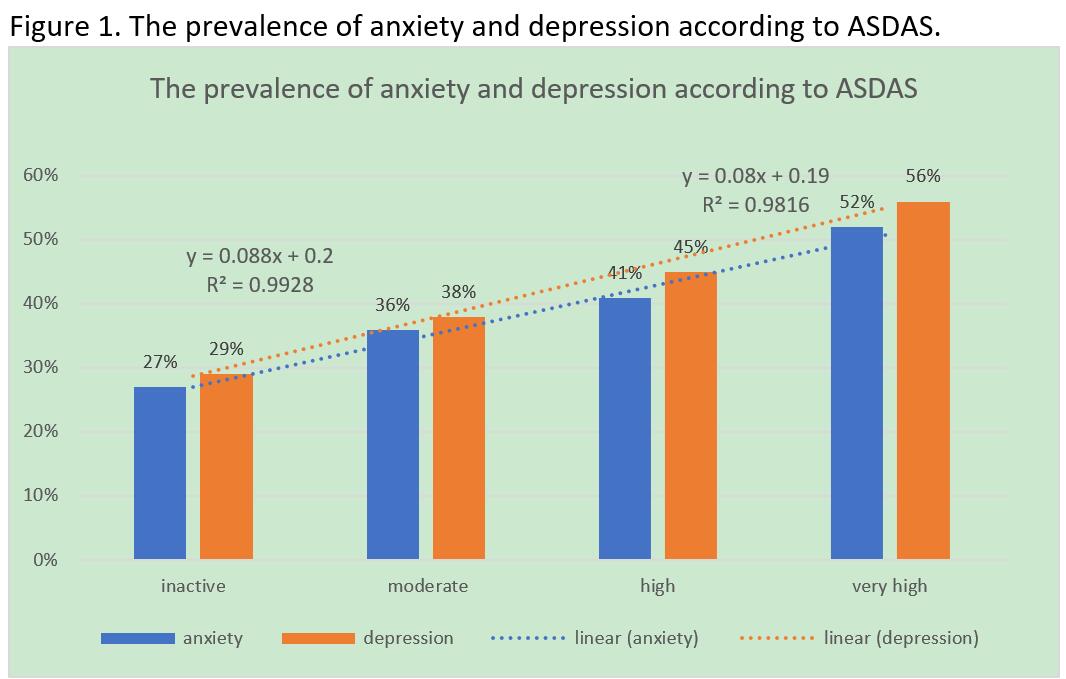Session Information
Date: Sunday, November 8, 2020
Session Type: Poster Session C
Session Time: 9:00AM-11:00AM
Background/Purpose: WHO survey showed that the prevalence of anxiety and depression in Chinese population and Chinese patients with chronic diseases were between 3.1% – 4.2% and 3.1% – 7.3%, respectively. Ankylosing Spondylitis Disease Activity Score (ASDAS) and Hospital Anxiety and Depression Scale (HADS) are commonly used to evaluate AS patients’ disease activity and mental health. All those assessments were mainly performed by health professionals (HCPs) with paper questionnaire previously. SSDM is a novel smart disease management tool that allows patients to do self-assessments on ASDAS and HADS by mobile terminals.The purpose of this study is to estimate the prevalence of anxiety and depression in Chinese patients with AS and to analyze the potential association between disease activity and mental health.
Methods: Under the guidance and training by HCPs, AS patients downloaded SSDM and performed self-assessments bundle of ASDAS and HADS with SSDM. ASDAS< =1.3, 1.3-2.1, 2.1-3.5 and >3.5 are defined as inactive (IDA), moderate (MDA), high (HDA) and very high (VHDA) disease activity, respectively. ASDAS score < =1.3 represents inactive disease status and achievement of T2T. HADS score >=8 can be diagnosed with anxiety or depression.
Results: From June 2016 to Jan 2020, 1,931 AS patients (1,118 male, 813 female) with a mean age of 34.09 ± 11.86 (12-82) years and the median disease duration of 2.61 years from 207 hospitals performed bundle self-assessments for 2,477 times in total. According to the HADS and ASDAS assessment results, the prevalence of anxiety and depression in all patients was 36.7% and 39.3% respectively, which was significantly higher than that in the WHO survey in Chinese population and chronic disease patients. The proportion of patients achieved and failed on T2T was 29% and 71%, respectively. The prevalence of anxiety (A) and depression (D) was 25% and 23% among T2T achievers; and 37% and 32% among T2T failures, respectively (pA< 0.05, pD< 0.05).
According to ASDAS, in IDA, MDA, HDA and VHDA subgroups, the prevalence of anxiety and depression was 27%, 36%, 41%, 52% and 29%, 38%, 45%, 56%, respectively. The correlation coefficients of anxiety (A) and depression (D) with ASDAS were rA=0.9908 and rD=0.9964. It suggested that with the increase of disease activity, the proportion of AS patients with anxiety and depression increased significantly. (Figure 1)
Conclusion: The prevalence of anxiety and depression in AS patients was significantly higher than that in the WHO survey in Chinese population and chronic disease patients. Higher prevalence of anxiety and depression were associated with higher levels of disease activity. SSDM is an effective mobile interface to monitor and study entanglement of disease activity and mental health in AS patients, which build a foundation for proactive interventions in future.
To cite this abstract in AMA style:
Song H, Wei H, Zhang M, Wu L, Wu Z, Chu A, Wang B, Fan W, Wang X, Chen X, Wu H, Zhou W, Xiao F, Xiao H, Jia Y, Wu B, Lu J. Disease Activity and Mental Health of as Patients: A Cross-section Study with Self-assessments Based on Smart System of Disease Management (SSDM) Mobile Tools [abstract]. Arthritis Rheumatol. 2020; 72 (suppl 10). https://acrabstracts.org/abstract/disease-activity-and-mental-health-of-as-patients-a-cross-section-study-with-self-assessments-based-on-smart-system-of-disease-management-ssdm-mobile-tools/. Accessed .« Back to ACR Convergence 2020
ACR Meeting Abstracts - https://acrabstracts.org/abstract/disease-activity-and-mental-health-of-as-patients-a-cross-section-study-with-self-assessments-based-on-smart-system-of-disease-management-ssdm-mobile-tools/

